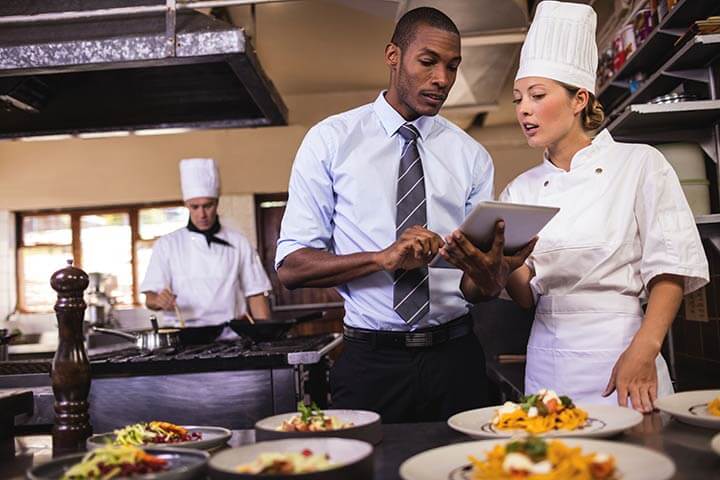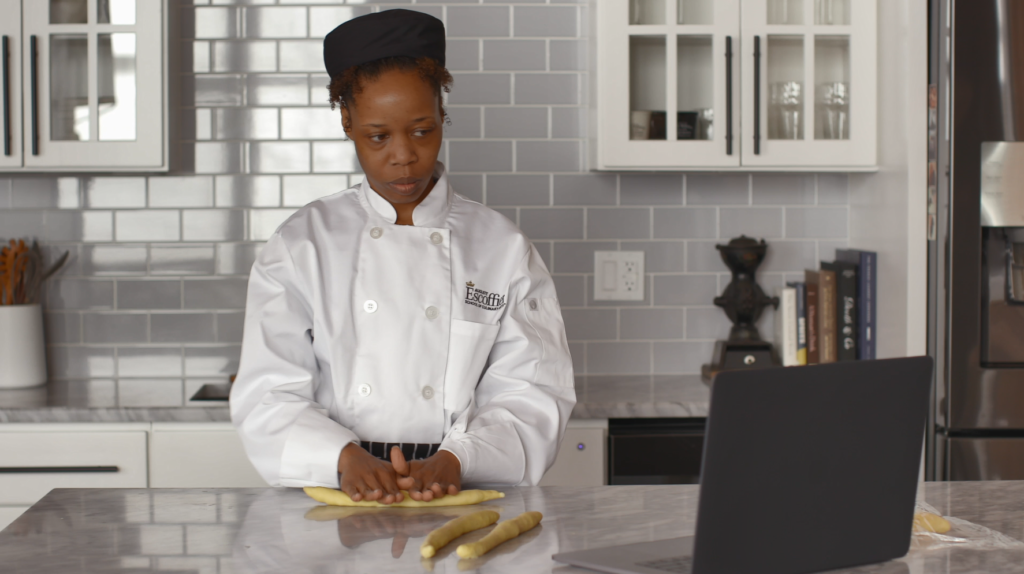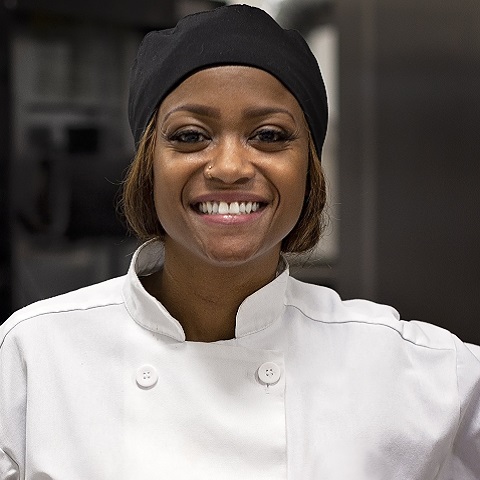Expert cooking skills may be enough for a place on the line or in the prep area. But for those who want to excel in their careers and earn the title of “Chef,” there are additional strengths you must bring to the table.
There are plenty of non-culinary skills that chefs must have, and these can be the difference between a brilliant career and an ordinary one. Here are four skills that will serve you well through any profession, but especially a future in the culinary arts.
1. Excellent Communication
Most chef positions are supervisory. So whether you’re a sous chef, chef de cuisine, or executive chef, you can expect to have some management responsibilities.
Managing people always requires effective communication skills so you can provide positive and negative feedback, instruction, delegate tasks, and mediate issues between staff members. Chefs must also take criticism with grace. Everyone, including the executive chef, has a boss, unless they’re the owner. And even if they are, they still have to answer to customers and critics.
Communication is a learned skill, just like balancing flavors or making the perfect hollandaise. Culinary school students receive feedback and suggestions from their Chef Instructors, so they’ve had practice with outside evaluation.
At Auguste Escoffier School of Culinary Arts, students working toward their associate degrees will take a Business & Professional Communications course where they work on their listening skills, verbal and nonverbal communication, conflict resolution, and debate techniques.
Plus, online Culinary Arts and online Baking & Pastry students gain additional valuable practice in their written communications. Online students will submit a written summary of their cooking assignments to their Chef Instructors for evaluation. This lets them hone their language around both food and flavor.
“[Escoffier’s online culinary program] has made me a better cook, a better baker, a better leader, a better businessman, and most importantly, a better teacher to my staff.”
Lance McWhorter, Online Culinary Arts Graduate, Food Network “Chopped” Contestant, Executive Chef/Owner of Culture ETX Restaurant
2. Technology Know-How
The chef’s life used to be relatively low tech. Tickets were hand written and passed to the kitchen, and inventory was a pencil-and-paper affair.
Increasingly sophisticated POS systems and online inventory management software can make the modern chef’s life easier, but only if they know how to use them!
Technology isn’t only changing in the back of house, either. Customers interact with restaurants differently than they used to, with smartphone apps, online ordering, self-serve kiosks, and table side tablets changing the way they place orders.
A survey by the National Restaurant Association showed that 70% of 18- to 34-year-olds feel restaurant technology increases convenience. And convenience is a driving factor for the younger generations — especially Gen-Z. Chefs need to keep ahead of changes in tech and the way consumers respond to those changes if they want to stay competitive.
We’re seeing this even more during COVID-19. Restaurants have had to get creative with how they communicate and serve customers, moving to more digital models and away from in-person interactions.
While chefs usually aren’t in charge of restaurant tech, they may need to step in to troubleshoot an issue if something isn’t working.
Students in Escoffier’s online programs develop some basic technology skills throughout their programs. With a 100% online curriculum, students will watch videos, chat with their peers and instructors, and submit their assignments entirely online.
Culinary students also get the chance to build their professional networks of both fellow students and Chef Instructors. Graduates can get advice from their industry peers about new tech innovations to try, and which to avoid!
3. Math Mastery
Chefs are responsible for a lot more in a restaurant than just cooking the food! They also have to design recipes, place orders, establish the cost of each dish, and figure out how much to charge for them.
This is all part of managing the restaurant’s food costs, and it’s a vital part of every foodservice operation.
Students in most Escoffier programs study these basics in Foodservice Math & Accounting. This course discusses concepts of accounting and managing food and labor costs. Some programs include additional levels of coursework on pricing menus and managing expenses. A degree in Culinary Arts, for example, includes a Culinary Foundations course, which discusses portion sizing, food costing, and yield analysis to help students understand the numbers.
“Anybody can say they are a chef. As far as the management portion, that is where Escoffier is really helping me actually run a restaurant, run a café, or run a business.”
Tiffany Moore, Online Culinary Arts Graduate and Co-Founder/Chef at Event Hall @ Cascade
4. Organization and Prioritization
You know how important mise en place is at your station. And you know that the order of operations in cooking can be key — especially in baking!
The same is true of your non-cooking responsibilities.
Chefs have a lot to manage:
- Scheduling
- Hiring/Training
- Recipe development
- Inventory
- Ordering
- Quality control
And all that before the cooking even begins!
The executive chef will have help, but they have to delegate and follow up to make sure nothing is forgotten or only half-done. And they have to ensure there is enough time in the day for each team member to complete their tasks — or face the dreaded overtime!
It’s a big job, so chefs have to stay organized and always know what needs to happen next.
Culinary school students — especially online students — are often juggling school with work and families. So they get a crash course in the importance of staying organized and keeping track of their responsibilities.
And any Escoffier students who are having a hard time can discuss their struggles with their Success Coach! Each student is assigned a Success Coach upon their enrollment at Escoffier. This advocate will help you keep your education on track, whether you’re facing financial, technological, or organizational difficulties.
A Success Coach is in your corner to help you make it from the first day of class all the way to graduation day.
How It All Works Together
These important non-cooking skills come together for a more effective and successful restaurant operation.
Proper communication means better training, which allows for more delegation. That frees up the chef’s time to focus on reducing food waste and managing costs, which improves the bottom line. Saving money provides more resources for upgrades, like a super-efficient digital ticketing system…it’s all interconnected!
Chefs need a holistic set of skills so they can bring more to the business than just great food. And with an education from Escoffier, future culinarians could develop the culinary and business foundations they need to be an asset to their employers.
To learn more about Escoffier’s business-focused degrees and diplomas, contact us today!
Interested in learning more about culinary and business skills? Try these articles:
- Culinary School Graduates Will Require New Skills Post-COVID-19
- How Culinary School Can Help You Write and Implement a Restaurant Business Plan
- How to Start Your Own Food Truck
This article was originally published on February 1, 2016, and has since been updated.


 “[Escoffier’s online culinary program] has made me a better cook, a better baker, a better leader, a better businessman, and most importantly, a better teacher to my staff.”
“[Escoffier’s online culinary program] has made me a better cook, a better baker, a better leader, a better businessman, and most importantly, a better teacher to my staff.”

 “Anybody can say they are a chef. As far as the management portion, that is where Escoffier is really helping me actually run a restaurant, run a café, or run a business.”
“Anybody can say they are a chef. As far as the management portion, that is where Escoffier is really helping me actually run a restaurant, run a café, or run a business.”


